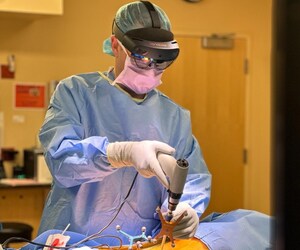For the first time in Israel, Neurosurgery will be performed using the Surgical Theater® virtual and augmented reality technology at Rambam Medical Center
Rambam Medical Center has purchased the Plan and OR Visualization 3D-360° Visualization surgical technology of the Israel-American company, Surgical Theater.
LOS ANGELES, Aug. 16, 2021 /PRNewswire/ -- Rambam Healthcare Medical Center will be the first medical center in Israel to use Virtual and Augmented Reality to plan and perform surgeries in Neurosurgery and Pediatric Neurosurgery, using the technology of the Israeli-American company, Surgical Theater. This XR platform will serve the specialists at the departments of Neurosurgery and Pediatric Neurosurgery, allowing them to plan surgeries and navigate via 3D technology, instead of relying on two-dimensional CT and MRI scans.
The Surgical Theater platform processes two-dimensional imaging scans of the patient, such as CT and MRI, and builds a realistic 3D-360°reconstruction, which, together with augmented reality goggles, the surgeon can "fly" inside the brain of a patient, comprehend their anatomical structure and plan a surgical approach prior to surgery. Presurgical planning, especially during complex procedures, provides the surgeon with the ability to plan the most optimal approach, helping to prevent damage to critical clinical and vascular structures.
The same patient specific model that is built during planning is also used in the operating room for enhanced visualization. The surgeon is able to superimpose in real time, an augmented reality overlay onto the live surgical site with the use of the Medtronic StealthStation S8 a and surgical microscope.
Professor Gill Sveri, head of the Department of Neurosurgery at Rambam Medical Center says, "I am happy and proud that we are the first hospital in Israel to use virtual reality and augmented reality in performing neurosurgery. It is revolutionizing the operating room. Through this platform, we can plan access to the brain during surgery in a clear and tangible way, via a 3D-360°view. This is in comparison to our ability today, using CT or MRI scans that only give us a 2-dimensional picture alone. This platform has simulator features that allow advanced planning of a surgical procedure. Additionally, the plan assists during surgery and provides a 3-dimensional picture of the brain and the brain tumor during surgery, while simultaneously enabling augmented reality visualization through microscope lenses and navigation within the head of the patient."
Professor Sviri adds, "The Surgical Theater platform will also assist young physicians who have not yet performed many surgeries and will allow them to practice and plan surgeries at far greater efficiency, through better understanding of brain anatomy. Learning through simulation is a very important component in training and practice for surgeons."
Professor Moni Benifla, head of the Department of Pediatric Neurosurgery at Rambam Medical Center says, "Without a doubt, the Surgical Theater platform improves our understanding of each case, the anatomy of the patient and the confidence and precision of the surgeon. This platform is expected to improve the efficiency of surgeries given that it presents the picture far more clearly in 360°. I have no doubt that in the not-too-distant future, these platforms will become standard in every operating room, improving the chances of success, mainly with respect to complicated procedures such as in neurosurgery."
Alon Zuckerman, Chief Operating Officer at Surgical Theater says, "We are happy that the Department of Neurosurgery at Rambam Medical Center has adopted virtual and augmented reality in their operating rooms. It is a significant step in the development of medicine in Israel, and through implementing this revolutionary technology, we believe that its use will be extended to additional departments in the health center. Rambam Medical Center joins tens of medical centers around the world who have implemented our visualization platform in their ORs and clinics, including George Washington University in DC, Mayo Clinic, New York University, Stanford University, Mount Sinai, UCSF Medical center, and many others. To date, Surgical Theater has supported more than 15,000 complex surgeries, as well as over 100,000 patient consultations.
SOURCE Surgical Theater

Related Links
WANT YOUR COMPANY'S NEWS FEATURED ON PRNEWSWIRE.COM?
Newsrooms &
Influencers
Digital Media
Outlets
Journalists
Opted In






Share this article